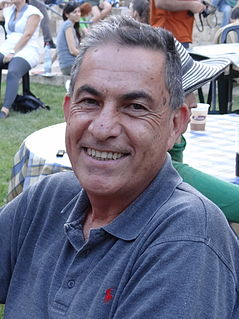A Quote by Thomas Pynchon
The Saint whose water can light lamps, the clairvoyant whose lapse in recall is the breath of God, the true paranoid for whom all is organized in spheres joyful or threatening about the central pulse of himself, the dreamer whose puns probe ancient fetid shafts and tunnels of truth all act in the same special relevance to the word, or whatever it is the word is there, buffering, to protect us from. The act of metaphor than was a thrust at truth and a lie, depending where you were: inside, safe or outside, lost.
Quote Topics
About
Act
Ancient
Breath
Central
Clairvoyant
Depending
Dreamer
God
Himself
Inside
Joyful
Lamps
Lapse
Lie
Light
Lost
Metaphor
Organized
Outside
Paranoid
Probe
Protect
Pulse
Puns
Recall
Relevance
Safe
Saint
Same
Special
Spheres
Than
Threatening
Thrust
True
Truth
Tunnels
Us
Water
Were
Whatever
Whom
Whose
Word
Related Quotes
And last are the few whose delight is in meditation and understanding; who yearn not for goods, nor for victory, but for knowledge; who leave both market and battlefield to lose themselves in the quiet clarity of secluded thought; whose will is a light rather than a fire, whose haven is not power but truth: these are the men of wisdom, who stand aside unused by the world.
All about us, in earth and air, wherever the eye or ear can reach, there is a power ever breathing itself forth in signs, now in daisy, now in a wind-waft, a cloud, a sunset; a power that holds constant and sweetest relation with the dark and silent world within us. The same God who is in us, and upon whose tree we are the buds, if not yet the flowers, also is all about us- inside, the Spirit; outside, the Word. And the two are ever trying to meet in us.
Now it is not everybody, even amongst our respected friends and esteemed acquaintance, whom we like to have near us, whom we like to watch us, to wait on us, to approach us with the proximity of a nurse to a patient. It is not every friend whose eye is a light in a sickroom, whose presence is there a solace.
Now see what a Christian is, drawn by the hand of Christ. He is a man on whose clear and open brow God has set the stamp of truth; one whose very eye beams bright with honor; in whose very look and bearing you may see freedom, manliness, veracity; a brave man--a noble man--frank, generous, true, with, it may be, many faults; whose freedom may take the form of impetuosity or rashness, but the form of meanness never.
The most ancient parts of truth . . . also once were plastic. They also were called true for human reasons. They also mediated between still earlier truths and what in those days were novel observations. Purely objective truth, truth in whose establishment the function of giving human satisfaction in marrying previous parts of experience with newer parts played no role whatsoever, is nowhere to be found. The reasons why we call things true is the reason why they are true, for to be true means only to perform this marriage-function.
The life-giving preacher is a man of God, whose heart is ever athirst for God, whose soul is ever following hard after God, whose eye is single to God, and in whom by the power of God's Spirit the flesh and the world have been crucified, and his ministry is like the generous flood of a life-giving river.
Poetical feelings are a peril to scholarship. There are always poetical people ready to protest that a corrupt line is exquisite. Exquisite to whom? The Romans were foreigners writing for foreigners two millenniums ago; and for people whose gods we find quaint, whose savagery we abominate, whose private habits we don't like to talk about, but whose idea of what is exquisite is, we flatter ourselves, mysteriously identical to ours.
A gentleman, is a rarer thing than some of us think for. Which of us can point out many such in his circle--men whose aims are generous, whose truth is constant and elevated; who can look the world honestly in the face, with an equal manly sympathy for the great and the small? We all know a hundred whose coats are well made, and a score who have excellent manners; but of gentlemen how many? Let us take a little scrap of paper, and each make out his list.
During the past eleven days here in the Muslim world, I have eaten from the same plate, drunk from the same glass, and slept on the same rug - while praying to the same God - with fellow Muslims, whose eyes were the bluest of blue, whose hair was the blondest of blond, and whose skin was the whitest of white. And in the words and in the deeds of the white Muslims, I felt the same sincerity that I felt among the black African Muslims of Nigeria, Sudan and Ghana.







































